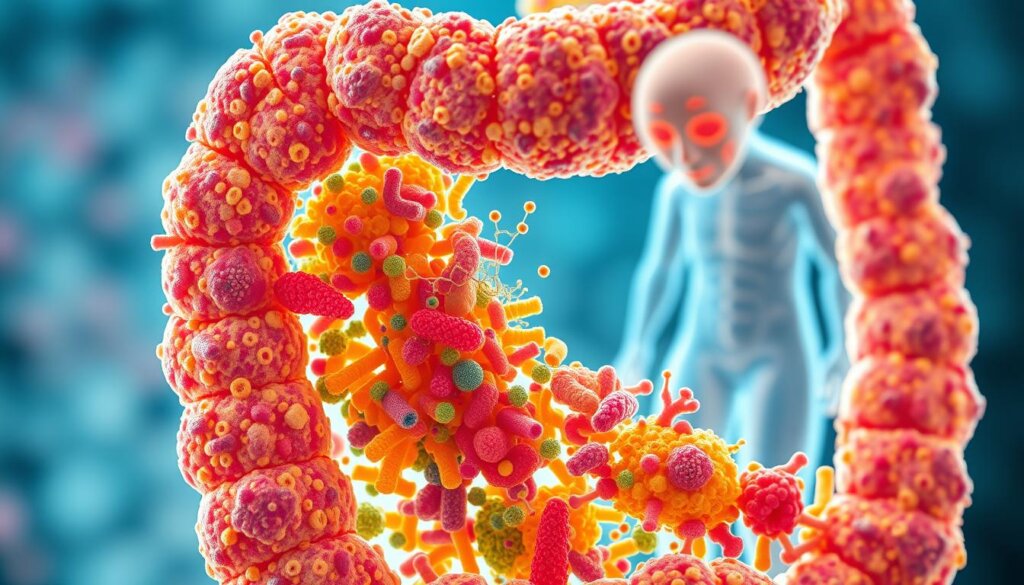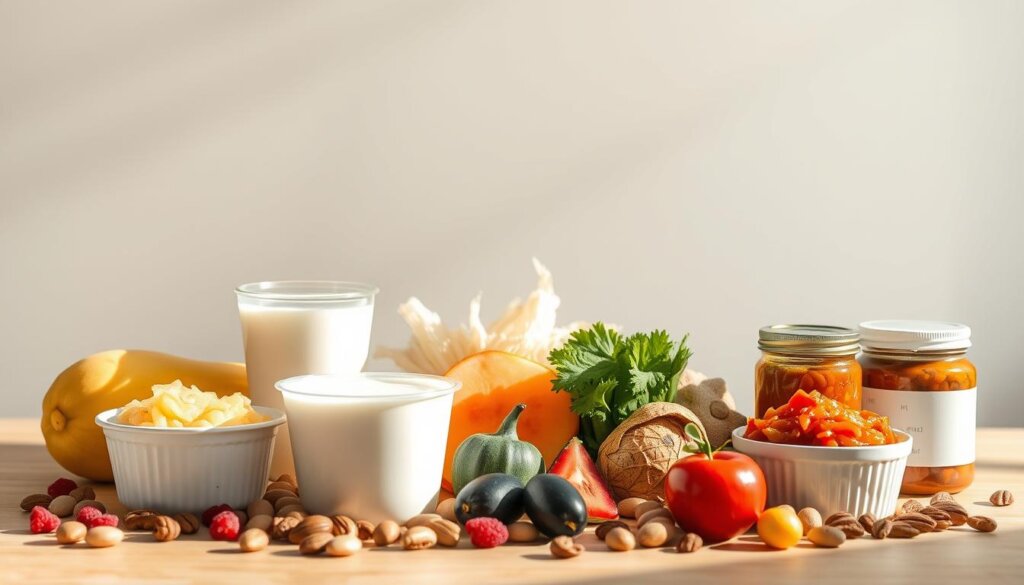Do Probiotics Impact Longevity? Wellness Group Shares the Facts
With global life expectancy expected to reach the mid-70s by 2050, people are searching for ways to stay healthy as they age. The Wellness Group, a trusted name in health education, examines whether gut-friendly bacteria play a role in extending our best years.
Modern research reveals fascinating connections between gut health and aging. As populations grow older, many experience “inflammaging” – chronic low-grade inflammation – alongside changes in gut microbiota diversity. These shifts may weaken immune function over time.
The Wellness Group translates complex science into practical advice. Their latest findings explore specific strains like Bacillus subtilis and Lactobacillus plantarum JBC5, which show promise for supporting vitality. This article separates fact from fiction about how microscopic allies might influence our health span.
Key Takeaways
- Global life expectancy continues rising, creating new health challenges
- Gut microbiome changes correlate with immune system aging
- Certain bacterial strains demonstrate anti-aging potential in studies
- Chronic inflammation may accelerate age-related decline
- Wellness Group provides evidence-based insights on microbial health
The Science Behind Probiotics and Aging
Scientists now understand how microscopic gut inhabitants shape our golden years. The gut microbiota evolves with age, influencing everything from digestion to immune defenses. Research shows elderly individuals often experience a 10% decline in Firmicutes bacteria, while Bacteroidetes levels rise.

How Gut Health Influences Longevity

Click to LEARN MORE
Age-related shifts in gut bacteria can weaken intestinal barriers, leading to “leaky gut.” This allows toxins to enter the bloodstream, triggering chronic inflammation. Over time, this cycle accelerates cellular damage linked to arthritis and heart diseases.
“Maintaining microbial balance is crucial for resisting infections as we age,” notes Dr. Mónica de la Fuente during her SEPyP workshop. Her research highlights how specific strains enhance immune responses in older adults.
The Role of Probiotics in Combating Inflammaging
Probiotic bacteria like Bifidobacterium may reduce oxidative stress, a key driver of inflammaging. Studies suggest these strains strengthen tight junctions in the gut lining, preventing harmful leaks. Other benefits include:
- Supporting nervous system health via the gut-brain axis
- Restoring microbial diversity lost with age
- Lowering markers of systemic inflammation
| Gut Bacteria | Youth | Elderly |
|---|---|---|
| Firmicutes | High | Declines by ~10% |
| Bacteroidetes | Balanced | Increased |
| Bifidobacterium | Abundant | Often depleted |
For those exploring dietary strategies, evidence points to targeted probiotic use as a promising tool. While clinical trials remain limited, early results show a clear correlation between gut health and vitality in later life.
Key Research Findings on Probiotics and Lifespan
Recent breakthroughs reveal how specific bacterial strains influence aging processes. Studies using *Caenorhabditis elegans*, a tiny worm with conserved aging genes, show promising results. These findings may translate to human health strategies.
Bacillus Subtilis: A Longevity-Boosting Probiotic
A Nature Communications study found *Bacillus subtilis* spores colonize the gut, forming protective biofilms. This process enhanced the worms’ immune defenses and reduced oxidative stress by 34%.
“Biofilm-mediated quorum sensing activates longevity pathways shared across species,” explains Dr. Roberto Grau. His team observed a 20% lifespan extension in treated *C. elegans*.
Lactobacillus Plantarum JBC5 and Its Anti-Aging Effects
The *Antioxidants* journal reported *L. plantarum JBC5* triggered SKN-1 genes, boosting cellular repair. Key benefits included:
- 27.81% longer lifespan in *Caenorhabditis elegans*
- Reduced lipofuscin (age-pigment) accumulation
- Improved fat metabolism via serotonin signaling
| Strain | Mechanism | Effect |
|---|---|---|
| *B. subtilis* | Biofilm formation | Enhanced immune function |
| *L. plantarum JBC5* | SKN-1 activation | Cellular stress resistance |
While human trials are pending, IASST’s patented yogurt with *L. plantarum JBC5* (Patent 202231001501) offers a practical way to test these findings. Researchers caution that individual responses may vary based on gut microbiota diversity.
How to Incorporate Probiotics for a Healthier Life
Fermented foods and quality supplements offer an easy way to support digestive health. These options deliver live cultures that may enhance immunity and reduce inflammation. For personalized advice, the Wellness Group provides consultations via WhatsApp.

Probiotic-Rich Foods to Add to Your Diet
Natural sources like kimchi and kefir contain diverse strains. Each offers unique health benefits:
- Natto (fermented soybeans): Rich in Bacillus subtilis for gut barrier support.
- Indian curd (dahi): Packed with Lactobacillus to aid digestion.
- Kombucha: Contains yeast and Acetobacter for detoxification.
| Food | Key Strains | Benefits |
|---|---|---|
| Kimchi | L. plantarum | Boosts immunity |
| Kefir | Multiple yeasts | Enhances calcium absorption |
| Sauerkraut | Leuconostoc | Reduces oxidative stress |
Choosing the Right Probiotic Supplements
Look for shelf-stable options with 10–50 billion CFUs (colony-forming units). Refrigerated brands often retain potency longer. Pair them with prebiotics like garlic or onions to fuel bacterial activity.
“Omega-3 fatty acids amplify anti-inflammatory effects when combined with probiotics,” suggests a Wellness Group nutritionist.
Avoid sugary drinks labeled as “probiotic.” For elderly individuals, targeted strains like Bifidobacterium may ease constipation—learn more here.
Conclusion
Emerging science suggests tiny gut allies could help us age gracefully. While not a “fountain of youth,” probiotics offer a science-backed tool to support vitality. Pairing them with Mediterranean or Okinawan diets may amplify benefits.
The Wellness Group crafts personalized plans for different life stages. Human trials continue, but early research mirrors promising results from nematode studies.
For tailored advice, message them on WhatsApp (+60123822655). Hours: Mon–Fri 9:30am–6:30pm, Sat–Sun 10am–5pm. Share this article—your 100-year-old self will thank you!

Click to LEARN MORE
Explore more about probiotic acidophilus benefits for men to boost your immune system naturally.
FAQ
Can improving gut health help people live longer?
Research suggests a healthy gut microbiome supports immunity, reduces inflammation, and may slow age-related decline. Strains like Bacillus subtilis show promise in extending lifespan in studies.
What is “inflammaging,” and how do probiotics help?
Chronic low-grade inflammation linked to aging, called inflammaging, weakens the immune system. Certain bacteria, such as Lactobacillus plantarum, may lower inflammation and support cellular repair.
Are probiotic foods better than supplements for longevity?
Fermented foods like yogurt, kimchi, and kefir provide natural probiotics and nutrients. Supplements offer targeted strains but should complement—not replace—a balanced diet.
How do probiotics protect against age-related diseases?
They strengthen the gut barrier, reduce oxidative stress, and enhance nutrient absorption. Studies link them to lower risks of diabetes, heart disease, and cognitive decline.
What should people look for in a probiotic supplement?
Choose strains with clinical backing, like Bacillus subtilis or Lactobacillus, and check for CFU counts (5–50 billion). Shelf-stable options ensure potency.

Khloe Tan
Khloe Tan is a Certified Nutritionist, Corporate Wellness Trainer, and Holistic Health Specialist with over 15 years of experience in the health and wellness industry. She has delivered more than 100 talks nationwide, inspiring and educating diverse audiences on nutrition, lifestyle, and sustainable wellness. Her work has positively impacted over 3,000 lives, and she continues to champion holistic approaches to well-being in both corporate and personal settings.
Feature Product
-
Hydrogen Water FIlter/Generator
H2zen Portable (White/ Blue)
RM2,600.00 Add to cart Buy NowRated 0 out of 5





